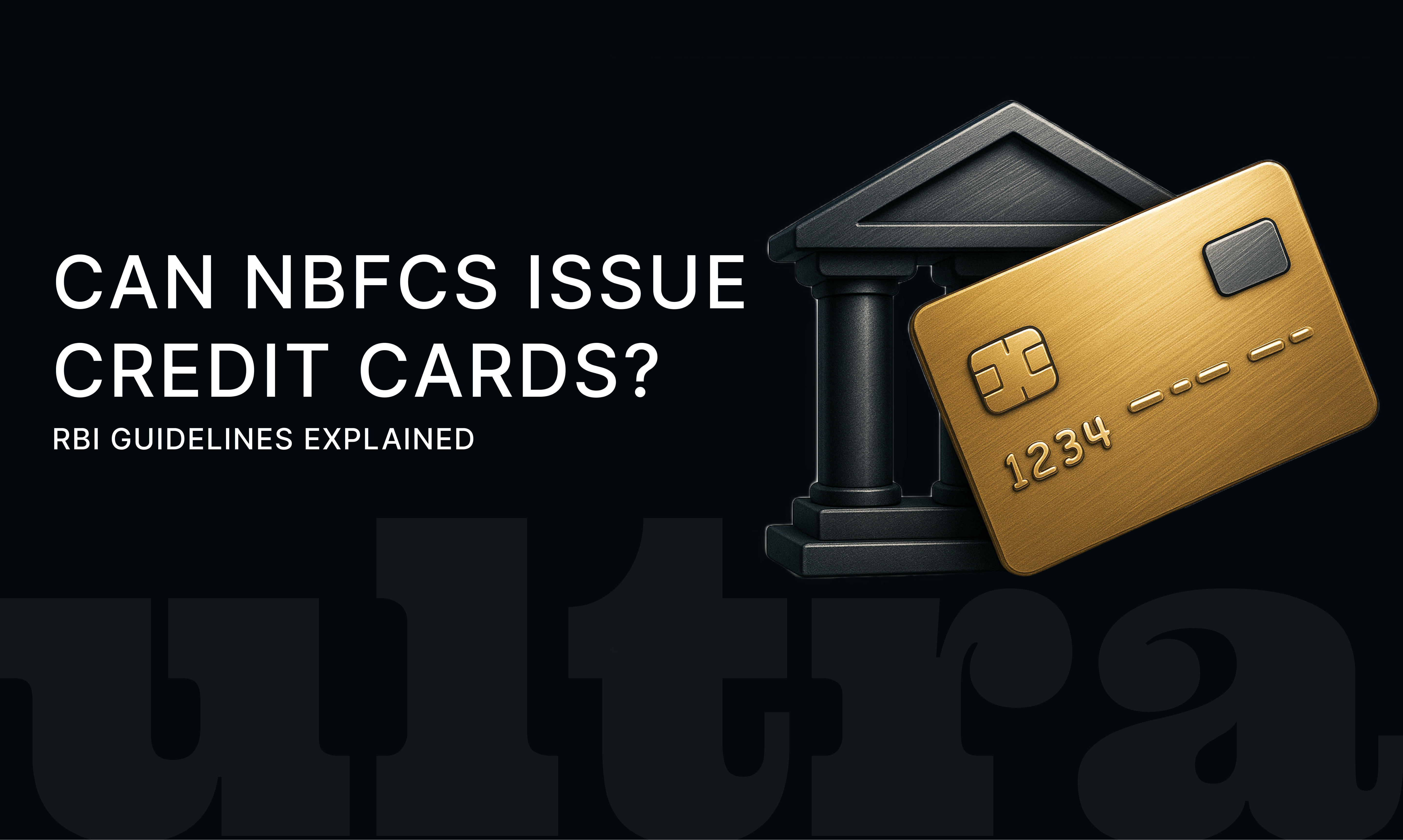Can NBFC Issue Credit Card? A Complete Guide
31 July 2025 · Sachin Gadekar
Explore how NBFCs can issue credit cards in India, recent RBI changes, and the future of credit access through non-banking financial companies.

What is an NBFC?
In the dynamic Indian financial ecosystem, the line between banks and Non-Banking Financial Companies (NBFCs) is slowly blurring. With the rise of fintech and digital lending platforms, one question that often arises is: can NBFC issue credit card?
The Reserve Bank of India (RBI) has traditionally restricted the issuance of credit cards to scheduled commercial banks. However, recent regulatory changes have opened the door for well-regulated NBFCs to explore the credit card business under specific conditions. This article unpacks everything you need to know about NBFCs, credit card issuance, and RBI's latest updates.
A Non-Banking Financial Company (NBFC) is a financial institution that offers banking services like loans, asset financing, leasing, and investment products, but does not hold a full banking license. NBFCs are regulated by the Reserve Bank of India under the RBI Act, 1934.
NBFCs play a vital role in financial inclusion by serving niche markets that traditional banks may not cater to—such as small business owners, rural populations, or gig workers.
Credit Card: A Brief Overview
A credit card is a financial instrument issued by banks or authorized financial institutions that allows cardholders to borrow funds within a pre-approved limit to pay for goods or services. Users are billed monthly and can repay either in full or via EMIs, usually with interest.
Issuing credit cards involves risk assessment, credit line management, billing cycles, and recovery protocols—activities that require strict regulatory oversight.
Can NBFCs Issue Credit Cards?
Yes, but with restrictions.
As per RBI’s updated guidelines, NBFCs can issue credit cards only with prior approval from the central bank. The RBI notification dated May 2022 clarified that NBFCs interested in offering credit cards must meet specific conditions and obtain a license to do so.
This is a significant shift from earlier regulations where credit card issuance was limited only to scheduled commercial banks and a few co-operative banks.
Key RBI Guidelines for NBFCs Issuing Credit Cards
Here’s what the RBI guidelines say about NBFCs issuing credit cards:
1. Eligibility
Only NBFCs with an asset size of ₹100 crore or more are eligible.
The company must have a proven track record in financial services and credit underwriting.
2. RBI Approval
NBFCs cannot start issuing credit cards without prior approval from the RBI.
A detailed proposal must be submitted to the RBI, which will assess risk management, IT infrastructure, grievance redressal, etc.
3. Partnership Model
NBFCs can also co-brand credit cards in partnership with scheduled commercial banks.
In such cases, the bank remains the principal issuer, and the NBFC acts as the distribution and servicing partner.
4. Compliance Requirements
NBFCs must follow all existing guidelines for data privacy, KYC, consumer protection, and credit discipline as mandated for banks.
Why Did RBI Allow NBFCs to Issue Credit Cards?
The RBI’s decision to allow NBFCs into the credit card space was driven by:
Need for innovation in credit card offerings (e.g., digital-first cards).
Increased credit penetration in Tier 2 and Tier 3 cities.
Support for financial inclusion by leveraging NBFCs’ local reach.
Demand from fintech NBFCs to offer seamless credit experiences.
Examples of NBFCs Entering Credit Card Space
Several NBFCs and fintechs have started offering co-branded or prepaid card solutions in collaboration with banks or payment networks. Some examples include:
Bajaj Finserv RBL Bank Credit Card – A co-branded product offering EMI-based shopping.
Slice, OneCard, and Uni Cards – NBFC-backed fintechs providing credit instruments that resemble credit cards.
With proper approvals, such platforms may transition into full-fledged NBFC-issued cards in the future.
Challenges NBFCs Face in Credit Card Issuance
Despite the green light from RBI, NBFCs face some roadblocks:
Stringent approval process by RBI.
High operational costs of managing credit card infrastructure.
Need for strong risk management systems.
Customer trust and brand recognition—still dominated by banks.
However, well-capitalized NBFCs with tech-first operations are expected to lead the change.
Opportunities for Investors and Consumers
With platforms like Ultra offering exposure to curated investment options—including NBFC-backed financial products—the entry of NBFCs into the credit card market could further open doors for private credit, consumer finance, and digital lending opportunities.
Ultra continues to monitor how innovations in NBFC space, including their potential to issue credit cards, can unlock new asset classes for investors.
FAQs
1. Can any NBFC issue a credit card?
No. Only NBFCs with assets over ₹100 crore and prior approval from RBI are allowed to issue credit cards.
2. What is the RBI rule for NBFCs issuing credit cards?
RBI allows NBFCs to issue credit cards if they meet eligibility norms and obtain approval. They must comply with all consumer protection and credit risk norms.
3. Can NBFCs issue co-branded cards?
Yes. Many NBFCs issue co-branded credit cards in partnership with banks, where the bank is the issuer, and NBFC acts as a marketing/distribution partner.
4. Why are NBFCs interested in issuing credit cards?
NBFCs want to offer credit cards to expand their consumer base, digitize lending, and provide flexible credit access, especially to underserved markets.
5. Is it safe to use credit cards issued by NBFCs?
If the NBFC is RBI-approved and follows regulatory norms, their credit card offerings are as safe as bank-issued ones.
Final Thoughts
To answer the central question—can NBFC issue credit card?—the answer is a conditional yes. With RBI's regulatory nod and proper compliance, NBFCs are now empowered to participate in India’s growing credit card ecosystem. As consumer demand for flexible credit grows, this move is expected to democratize access and bring in much-needed competition and innovation in the market.
Stay tuned to Ultra as we continue to explore how evolving regulations impact both your investments and your financial freedom.